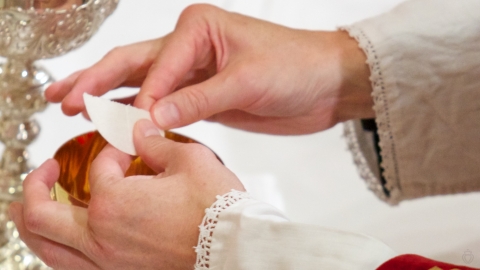500 Years After Luther’s Excommunication, a Common Message?

Statue of Martin Luther in Wittenberg
Cardinal Kurt Koch, President of the Pontifical Council for the Promotion of Christian Unity, spoke on the occasion of the reissue of the Joint Declaration on the Doctrine of Justification by Faith [Augsburg, October 31, 1999] , for reconciliation between Catholics and Lutherans.
“We hope that in the near future it will be possible to publish a joint message” signed by Catholics and Lutherans on the excommunication of Martin Luther, he told Vatican News on January 8, 2021.
On January 3, 1521, Martin Luther, father of Protestantism, was expelled from the Catholic Church following the publication of the papal bull Decet Romanum Pontificem.
On the occasion of the 500th anniversary of this excommunication, the Pontifical Council for the Promotion of Christian Unity and the Lutheran World Federation issued a revised Italian version of the “Joint Declaration on the Doctrine of Justification.”
The republication of this text wants to mark “the firm intention” of the Holy See as well as of the Lutherans to progress in reconciliation, declared Cardinal Koch. However, he acknowledges that Luther’s excommunication continues to represent a “painful wound in the history of the Catholic-Lutheran divide.”
In his bull, Pope Leo X defined Luther as “being the Antichrist,” recalls the Swiss cardinal.
The Lutheran World Federation and the Pontifical Council for the Promotion of Christian Unity are jointly attempting “to elucidate, from an ecumenical point of view [sic], the historical, theological, and canonical questions connected with this event,” and an expert group is focusing on this task, he continues.
Clearly, it is neither more nor less than ecumenically rewriting history, shedding light on the past in the light of the Second Vatican Council, and ensuring that the reasons for Luther’s excommunication appear today as “outdated.”
In Nouvelles de Chrétienté no.168, November-December 2017, Fr. Christian Thouvenot wrote: “On October 31, 1517, Martin Luther posted his 95 theses on the door of his convent. This was the start of the incredible action of this Augustinian monk, professor of biblical sciences at the University of Wittenberg, at the start of what history was to remember as the Protestant Reformation.”
He clarified: “The Lutheran reform is less a real reform than a revolution throwing down dogmas, religious practices, liturgy, sacraments, and divinely established authorities. It cut the Latin Church in two. On one side are the countries which would remain faithful to Catholic doctrine and subject to the jurisdiction of the Church, of the Bishop of Rome. On the other are countries which would embrace new ideas and fall into the hands of the lords of the state.
“On this October 31, 2017, where several ecumenical events are organized everywhere, the authorities of the current Church claim to commemorate or celebrate very sad events ... Luther, it will be understood, was one of the greatest heresiarchs of all time, responsible, along with Arius, for the loss of countless souls.”
“For his part, Bishop Fellay, the superior general of the Society of Saint Pius X, has already explained ‘that, in a few words, is why we cannot celebrate joyfully the 500th anniversary of the Protestant Reformation. Quite the contrary, we lament this cruel division. Following Our Lord, we pray and work so that the lost sheep might find again the path that will lead them safely to salvation, the path of the Holy Roman Catholic Church,’” (Letter to Friends and Benefactors no.87, April 26, 2017).
(Sources : cath.ch/imedia/vatican news/vatican.va/DICI n°405 – FSSPX.Actualités)
Illustration : OTFW, Berlin, CC BY-SA 3.0, via Wikimedia Commons



